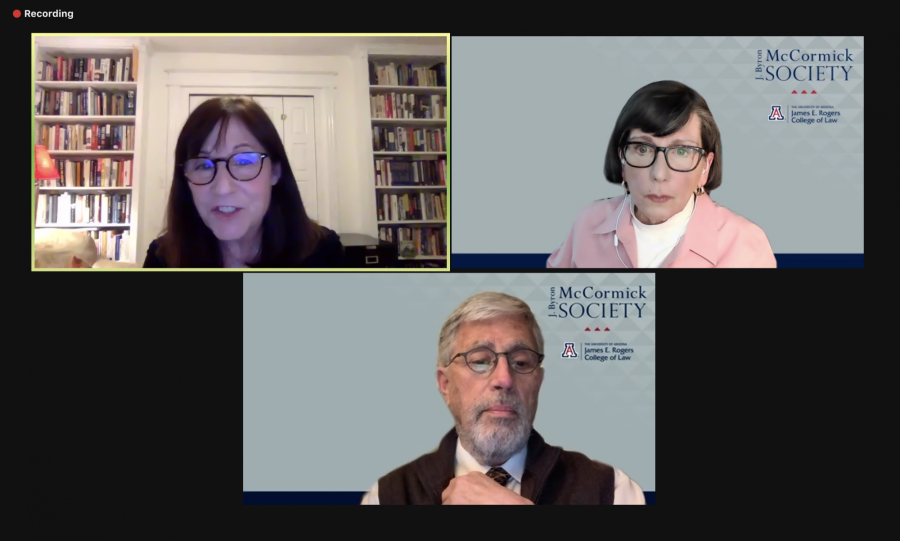At this year’s annual McCormick Lecture, Jane Mayer, celebrated investigative journalist and chief Washington correspondent at The New Yorker, dissected authoritarianism in modern America.
Mayer traced back from current events, drawing on her extensive research of the Koch brothers from her book “Dark Money: The Hidden History of the Billionaires Behind the Rise of the Radical Right,” in order to contextualize everything from former President Donald Trump’s election to the proliferation of disinformation in American politics.
The McCormick Distinguished Lecture Series brings in “eminent national and international experts on law and public affairs to speak to the University of Arizona campus,” according to the McCormick Society.
The society itself is associated with the University of Arizona James E. Rogers College of Law and is named for the former university president and dean of the College of Law, Dr. James Byron McCormick. This year, the college invited Mayer to present over Zoom with a Q&A segment moderated by Stephen Golden and professor Nancy Sharkey from the UA School of Journalism.
Mayer’s presentation was entitled “A Post-Mortem on Our Authoritarian Experiment” and she began by invoking the Senate’s recent acquittal of Trump’s second impeachment by the House of Representatives. Mayer interpreted this as a disturbing sign of continued corruption.
“When Stephen Golden and Nancy Sharkey and I came up with the idea for tonight’s lecture … we may have been a little bit overly optimistic,” Mayer said. “A post-mortem implies that the patient is dead, and — unfortunately — as of last Saturday where I live in Washington, authoritarianism had a worrisome pulse still.”
Mayer then proceeded to describe the descent of rioters on the capital on Jan. 6, and what she called Trump’s “conspiracy mongering” allowing previously fringe beliefs such as QAnon to gain more mainstream appeal. Mayer reflected on a Republican party that she said she views as being radicalized, now normalizing extremist views.
“So, how did we get here?” Mayer asked. “There are many answers to this, obviously, but it won’t surprise you that I see several of the central causes as entwined in various ways, with a disproportionate power, wielded in America during the past 50 years by a small group of extraordinarily wealthy, radical free-market industrialists who use their fortunes to impose their minority viewpoint on the country.”
Here, Mayer transitioned into a brief history of the Koch brothers and described how they wielded their wealth and influence to further what she called their “anti-government agenda.”
“They spread this information undermining the public’s faith in independent experts, whether in academia, science or the media,” Mayer said. “It’s hard to overstate how serious a problem it is in a democracy when the public no longer knows what’s true. As Voltaire warned, ‘those who can make you believe absurdities can make you commit atrocities.’”
Mayer recalled how inevitable her first discovery of the Koch brothers was while simply “following the money” as an investigative journalist. The Koch brothers get their immense wealth from their business Koch Industries, a Kansas-based conglomerate which is associated with oil refineries, ethanol plants and with the production of other fossil fuel derivatives.
“The two brothers’ fortunes were valued together at $120 billion making them together worth more than Jeff Bezos, the Amazon CEO and more than Bill Gates the founder of Microsoft,” Mayer said.
In 1980, one of the Koch brothers ran against Ronald Reagan as a libertarian, which ended in massive failure. After this attempt at public office, the Kochs pivoted their tactic to influencing American politics through more clandestine means.
“Charles Koch decided that politicians were, as he put it, just actors reading from scripts,” Mayer explained. “Instead of running for office, at this point, the Kochs decided it would be smarter to actually supply the themes and the words for the scripts.”
In addition to their “dark money” put towards spreading alternative facts, the Koch brothers have poured money into specific programs in what Mayer estimated is over 350 colleges and universities nationwide. Included in this list is the University of Arizona.
Despite their initial disdain for Trump, Mayer argued that the political environment, due in large part to the actions of the Koch, “ripened America for Trump.” She concluded her talk by addressing a question looking to the future of American democracy from the perspective of a journalist.
“A friend of mine, who’s another reporter, at the LA Times said to me, ‘You know, reporters are the last naïve,’” Mayer recalled. “I count myself as both idealistic and actually quite optimistic. I kind of think, if I get the story and give people the facts, it’ll make a difference, and that the truth matters — and I actually still believe that, but I’m pretty worried about it right now.”
Follow Hillary Schiff on Twitter









